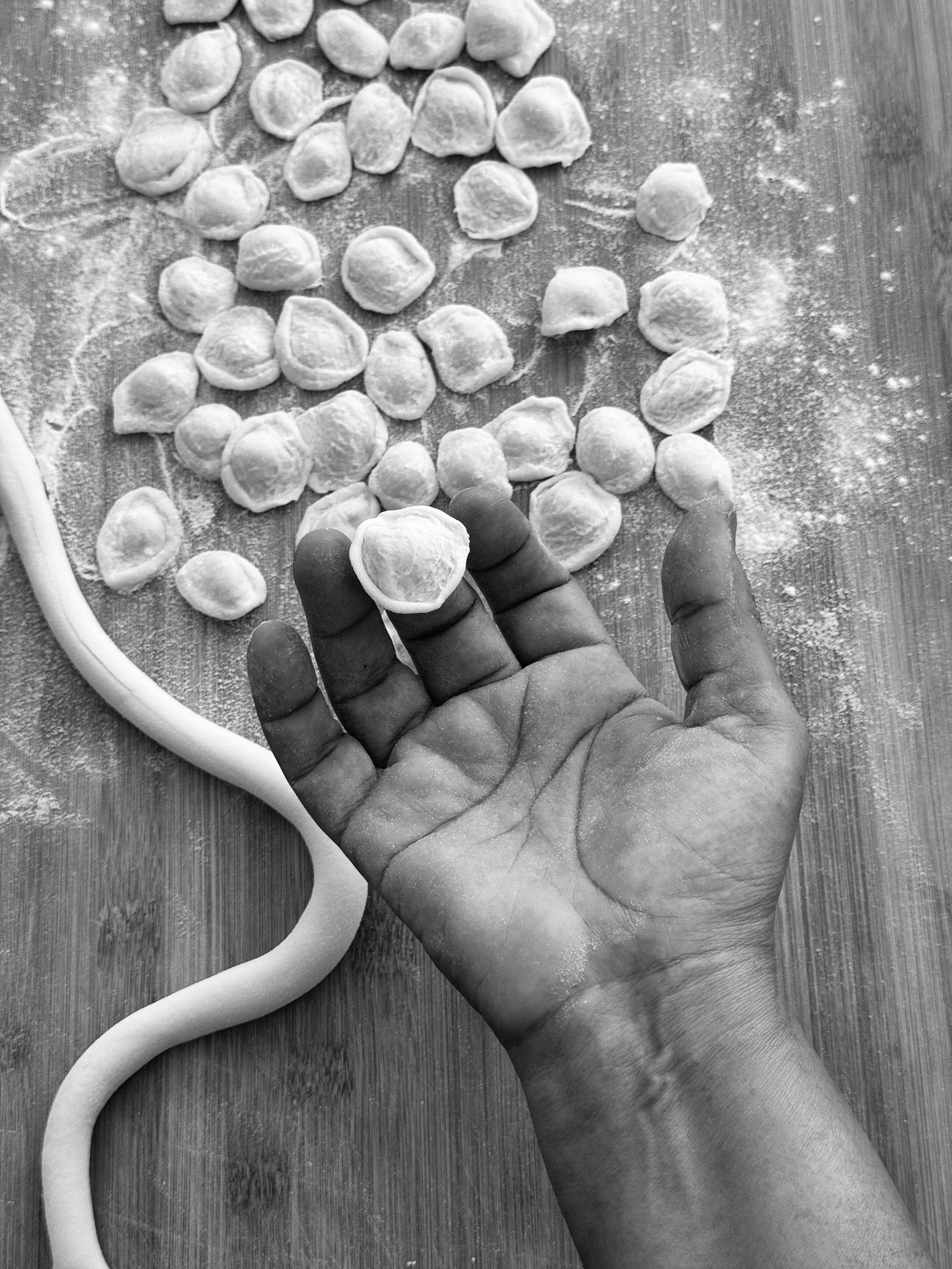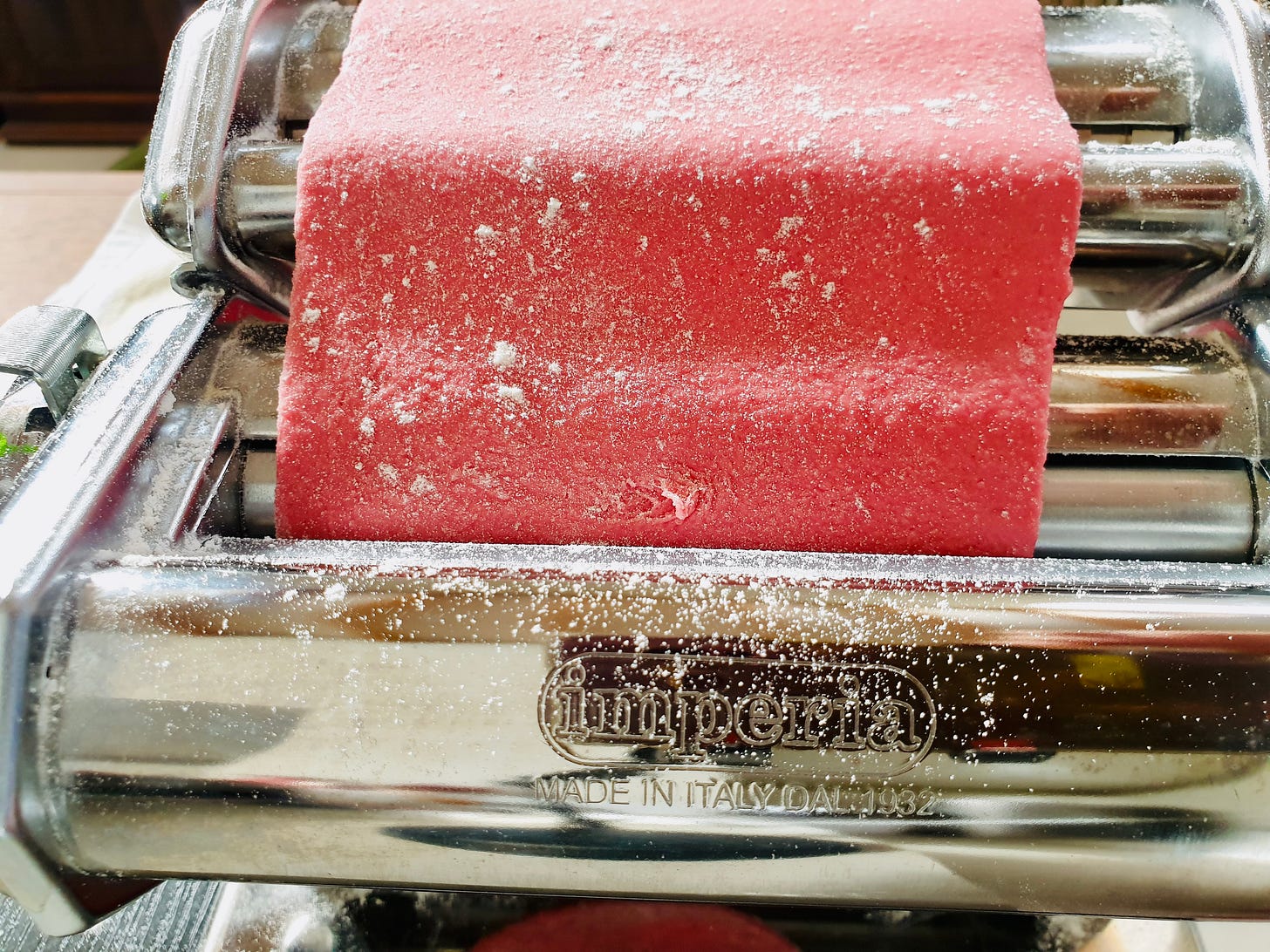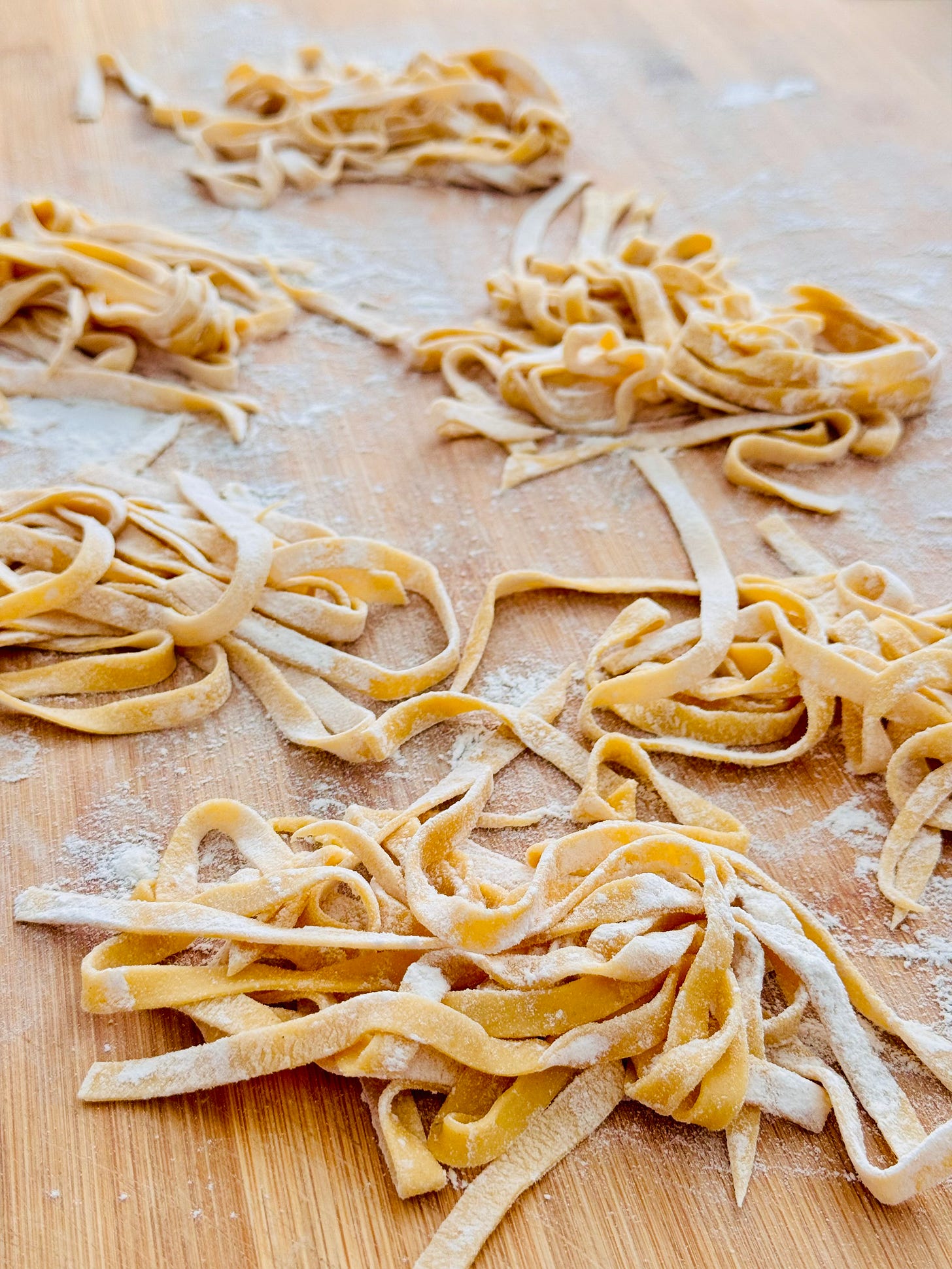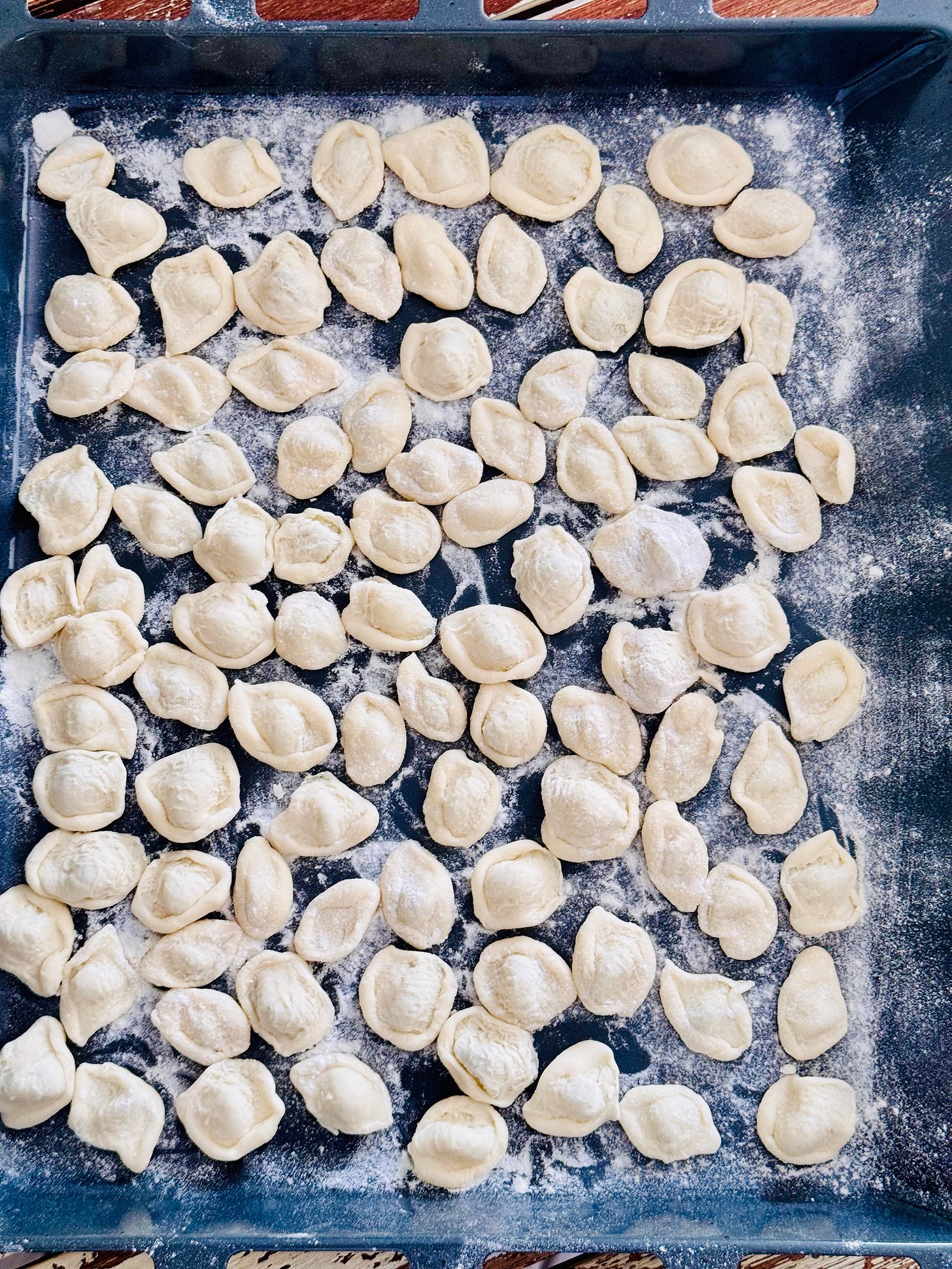Some meals are just recipes. Others are a memory, a tradition, a quiet moment between busy days. This is about the second kind. This is about pasta.
Not all of it is handmade. Sometimes it's dried from a box and tossed into boiling water after a long Tuesday. Sometimes it's rolled and shaped by hand on a floured counter, no machine needed and other times it’ s put through a machine. Either way, there’s love in it. There’s rhythm. There’s the kind of comfort that comes from watching sauce simmer on the stove while the house fills with that unmistakable scent of “something good’s coming.”
A simple start—where it all begins. Pasta, love, and a bit of magic.
This isn’t a collection of strict instructions—it’s more like a letter, a storybook, a passing down. Inside are a few favorite pasta dishes, but mostly, this is about what pasta brings out in us: the joy of feeding someone, the magic of slowing down, the little rituals that make a home feel full.
A Sauce Without Smell
I don’t have a sense of smell—never have. People often ask me what that’s like for someone who loves to cook, and I used to fumble around for an answer. Now I know. It’s this: I use the senses I do have, and I lean into them with everything I’ve got.
I taste. I touch. I see. I feel.
There’s this deep, gut-knowing—an instinct I’ve come to trust more than any timer or thermometer. And there’s love. Always love. Because for me, food isn’t just a sensory experience. It’s a language. An offering. A way of keeping the people I love close, warm, fed, and alive in every sense of the word.
On Sundays, I make a sauce. It bubbles away quietly while the house moves around it. That same sauce turns into a lasagna, a pasta bake, an eggplant dish, or something spooned over meat or fish. My children grew up with it as a kind of background music—comforting, reliable, forgiving.
And no, I can’t smell it. But I don’t need to. I know it’s right by the way the spoon moves through it. By the sound of the bubbles. By the way the color deepens slowly, patiently. Something wonderful is happening in my kitchen—and always has.
A Pasta Board in the Morning Light
I watched my mother-in-law’s hands move with such ease. It was like a dance—fluid, practiced, each movement purposeful yet effortless. In the mornings, before the house was fully awake, she would set up an extra board in the kitchen and begin making fresh pasta for the day’s meal. Every. Single. Day.
The board, well-worn and smooth from years of use, was her stage. Flour, water, and a little salt. And there, with a few swift motions, the dough would take shape. Orecchiette. That small, ear-shaped pasta that fit perfectly between the fingers. She never measured; she just knew. The rhythm of her hands was more than instinct—it was a language, a habit of the heart.
I was always intrigued by how precise and easy she made it look. She’d press the dough down, roll it out, and form each little ear so quickly, so assuredly. It was a quiet act, but to me, it felt like magic. Each piece was carefully shaped, yet it seemed to happen without any hesitation, as if her hands were speaking a language I couldn’t fully understand but could deeply feel.
When the pasta was ready, she’d set it aside to dry for a little while, and we’d wait together for the pot of water to come to a boil. She didn’t speak English, and I didn’t speak Italian, but we spent every day in that enormous, simple kitchen, side by side.
We didn’t need language. Food was our common ground. It became our way of understanding each other. Looking back, I didn’t realize then that we were building something I’d carry with me forever. A quiet complicated bond, made in flour, never perfect, and shaped with love.
Orecchiette was often on the menu, paired with a simple sauce made from whatever was fresh and in season. But even with just a few ingredients, it tasted like the world had paused for a moment to make everything just right. I really loved her food.
Making orecchiette is easier than it looks—but like all good things, it takes time and a little patience.
One word of advice: don’t let perfection get in the way. There’s more to this process than just the shape of the pasta. It’s a moment to slow down, to reflect, to connect with where you’ve been and where you are.
These little ears carry big stories💛
Homemade Orecchiette
Orecchiette—those little “ears” of pasta—are a staple in many Southern Italian kitchens, and they always remind me of my mother-in-law. She would make them every day, effortlessly, like she was continuing a centuries-old tradition.
Ingredients:
2 cups of all-purpose or bread flour (plus extra for dusting)
1 cup of semolina flour (for a slightly firmer texture)
1 cup of warm water (add a little more if needed)
Pinch of salt
Instructions:
Make the Dough:
In a large bowl, mix the all-purpose flour, semolina flour, and salt. Slowly add the warm water, stirring as you go. Once the dough starts to come together, knead it by hand until it’s smooth and elastic, about 8-10 minutes. If the dough feels dry, add a little more water, one tablespoon at a time.Rest the Dough:
Cover the dough with a clean towel or plastic wrap and let it rest for about 30 minutes. This will make it easier to shape the orecchiette.Shape the Orecchiette:
Break off a small piece of dough (about the size of a marble) and roll it into a small ball. On a floured surface, flatten it slightly with your thumb. Then, using the edge of a knife (or your thumb), press down and drag the dough across the board, creating a small, curved ear shape.Don’t worry if they’re not perfect—each orecchietta will have its own charm, just like every family kitchen does.
Cook the Pasta:
Bring a large pot of salted water to a boil. Drop the orecchiette in and cook for about 4-5 minutes, or until they float to the surface. Fresh pasta cooks much faster than dried, so keep an eye on them.Serve:
Drain the orecchiette and toss with your favorite sauce. For a classic pairing, I love it with a simple tomato sauce or a fresh pesto. Top it with a bit of grated parmesan or ricotta salata, and there you have it—pasta made with love, tradition, and just a touch of magic.










